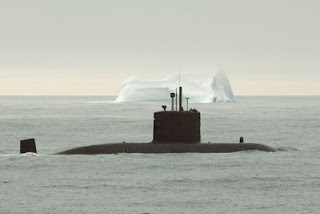-
United States Elevates Arctic to National Security Prerogative
January 16, 2009 By Will Rogers “The United States has broad and fundamental national security interests in the Arctic region and is prepared to operate either independently or in conjunction with other states to safeguard these interests,” states National Security Presidential Directive 66 (NSPD-66), issued by President Bush on Monday. NSPD-66 does pay some attention to “softer” Arctic issues, such as environmental protection, international scientific cooperation, and the involvement of the Arctic’s indigenous communities in decisions that affect them. But it still takes a tough stance on access to natural resources, boundary issues, and freedom of the seas/maritime transportation. With the rapid shrinking of Arctic ice caps making the region more accessible, the world is likely to see increased competition between the eight Arctic states—the United States, Canada, Denmark, Finland, Norway, Russia, and Sweden—over territorial claims and natural resources like oil and natural gas.
“The United States has broad and fundamental national security interests in the Arctic region and is prepared to operate either independently or in conjunction with other states to safeguard these interests,” states National Security Presidential Directive 66 (NSPD-66), issued by President Bush on Monday. NSPD-66 does pay some attention to “softer” Arctic issues, such as environmental protection, international scientific cooperation, and the involvement of the Arctic’s indigenous communities in decisions that affect them. But it still takes a tough stance on access to natural resources, boundary issues, and freedom of the seas/maritime transportation. With the rapid shrinking of Arctic ice caps making the region more accessible, the world is likely to see increased competition between the eight Arctic states—the United States, Canada, Denmark, Finland, Norway, Russia, and Sweden—over territorial claims and natural resources like oil and natural gas.
The opportunity to gain control over nearly a quarter of the world’s untapped oil and natural gas reserves will cause “a recalibration of geo-strategic power,” writes Scott Borgerson, visiting fellow for ocean governance at the Council on Foreign Relations, in the November 2008 issue of the Atlantic. With the world economic crisis slowing the development of alternative energy technologies, energy consumers will continue to be held hostage by volatile oil and natural gas markets, making those with control over these resources strong geopolitical players. Europe receives one-fifth of its natural gas from Russia, which has abundant reserves. And Russia has leveraged these reserves in an effort to slow the pace of former Soviet states’ accession into NATO and the EU.
Sweden and Norway recently forged a new defense relationship to address the rise of Russian power, and Finland, “also spooked by an increasingly assertive Russia,” will likely join the new Nordic defense pact. Among the pressing concerns for the Nordic alliance is to “make plans for what they call the ‘high north’, the energy-rich area that lies between Europe and the North Pole,” writes Edward Lucas in the Economist’s The World in 2009.
If the Nordic states gain significant control of Arctic oil and natural gas reserves, the European balance of power could shift further toward the West, a situation Russia is eager to prevent. Meanwhile, Canada, “alarmed by Russian adventurism in the Arctic,” has also strongly asserted its claims to Arctic sovereignty. “Canada has taken its sovereignty too lightly for too long,” said then-Prime Minister Stephen Harper in 2007. “This government has put a big emphasis on reinforcing, on strengthening our sovereignty in the Arctic.” Denmark, Great Britain, and Iceland, also mindful of the importance of Arctic resources, will likely stake claims to newly discovered resources. With the United States prepared to operate independently—at least according to the outgoing Bush administration—and its Arctic neighbors not likely to back away from their own interests, this once-frozen region could become a political hotspot.Photo: A Canadian naval submarine, the HMCS Corner Brook, patrols in Arctic waters as part of a Canada Command sovereignty operation in the Hudson Strait in August 2007. Courtesy of MCpl Blake Rodgers, Formation Imaging Services, Halifax, Nova Scotia, and flickr user lafrancevi.
 A Publication of the Stimson Center.
A Publication of the Stimson Center.

 “The United States has broad and fundamental national security interests in the Arctic region and is prepared to operate either independently or in conjunction with other states to safeguard these interests,” states
“The United States has broad and fundamental national security interests in the Arctic region and is prepared to operate either independently or in conjunction with other states to safeguard these interests,” states 

